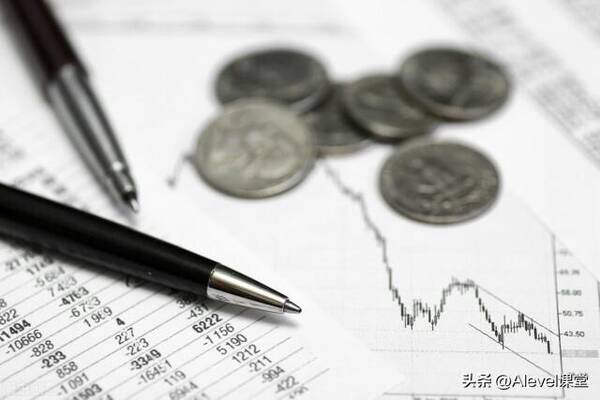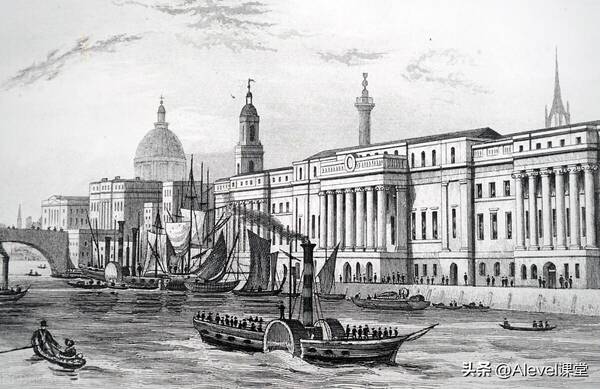The theory behind the proposition that free trade is a 'good' thing is that of comparative advantage. Some countries are relatively better at making some goods than others, even if they are absolutely worse at making all goods.
自由贸易是一件 "好事 "这一命题背后的理论是比较优势的理论。一些在制造某些商品方面比其他相对更好,即使它们在制造所有商品方面绝对更差。
This begs the question, 'why do countries have a comparative advantage in some goods and services but not in others?'. This, in turn, leads on to the question of competitiveness. For a country to be competitive internationally, it obviously has to have a comparative advantage in a reasonable number of goods and services. Is the UK competitive internationally?
这就提出了一个问题:"为什么各国在某些商品和服务方面有比较优势,而在其他商品和服务方面没有?这反过来又引出了竞争力的问题。一个要在国际上具有竞争力,显然必须在合理数量的商品和服务方面具有比较优势。英国在国际上有竞争力吗?
What determines comparative advantage? 什么决定了比较优势?
First and foremost, a country's available resources will determine where it has a comparative advantage. Saudi Arabia would not have a comparative advantage in the production of oil if it did not have so much oil under the worthless sandy deserts! The discovery of North Sea Oil turned the UK into a net exporter of oil rather than a net importer. Remember that we are not just talking about physical resources here. The quantity and quality of the human resources available is also crucial.
首先,一个的可用资源将决定它在哪里具有比较优势。如果沙特阿拉伯没有在毫无价值的沙质沙漠下拥有如此多的石油,那么它在石油生产方面就不会有比较优势! 北海石油的发现使英国成为石油的净出口国,而不是净进口国。请记住,我们在这里谈论的不仅仅是物质资源。可用的人力资源的数量和质量也是至关重要的。
This leads to the second important point. Private and public sector investment in human capital (through education and training) and in research and development (to develop new products or improve existing ones) can help create a comparative advantage in an area where a country is traditionally weak.
这就引出了第二个重要问题。私营和公共部门对人力资本(通过教育和培训)和研发(开发新产品或改进现有产品)的投资,有助于在一个传统的薄弱领域创造比较优势。
It should be noted that the areas in which a country has a comparative advantage can change over time, partly through the actions of the country in question, but also due to the improved efficiency (or discovery of new resources) in a competing country.
应该注意的是,一个拥有比较优势的领域可能会随着时间的推移而改变,部分原因是通过有关的行动,但也是由于竞争国的效率提高(或发现新资源)。
Although the UK used to have a comparative advantage in the production of many manufactured goods (we were, after all, one of the first countries to industrialise), nowadays our strength lies in areas such as chemicals, distribution and financial services (like banking and insurance). Unfortunately, most of these areas are not those that are successful in terms of international trade. Basically, the UK is quite good in the service sector, only around 20% of which is tradeable (how do you export a haircut?), but declining in manufacturing, which makes up most of a countries exports and imports. You will see why the UK has become less competitive in terms of the manufacturing sector.
尽管英国曾经在许多制成品的生产方面具有比较优势(我们毕竟是最早实现工业化的之一),但如今我们的优势在于化学品、分销和金融服务(如银行和保险)等领域。不幸的是,这些领域中的大多数并不是那些在国际贸易方面的成功。基本上,英国在服务领域相当不错,其中只有20%左右是可贸易的(你如何出口理发?),但在制造业方面却在下降,而制造业占了一个进出口的大部分。你会发现为什么英国在制造业方面的竞争力越来越差。
What determines the competitiveness of an economy? 什么决定了一个经济体的竞争力?
This is a similar question to the previous one. Some would say it is, effectively, the same question. If something happens that makes an industry within a country less competitive, then that country may cease to have a comparative advantage in that industry.
这是一个与前一个问题类似的问题。有人会说,这实际上是同一个问题。如果发生了一些事情,使得一个的某个行业竞争力下降,那么这个可能就不再在这个行业有比较优势了。
In this section, though, we will move away from basic questions about whether the country in question has the right resources. We shall look at 'price' and 'non-price' factors that continually affect the competitiveness of UK industry (N.B. mainly manufacturing industry).
不过,在这一节中,我们将远离有关是否拥有合适资源的基本问题。我们将研究不断影响英国工业(注:主要是制造业)竞争力的 "价格 "和 "非价格 "因素。
'Price' factors '价格'因素
- The exchange rate. This is the factor that one continually hears on the news in terms of the "strong pound causes problems for industry" type headline. If a country's currency is relatively strong, its exports will be relatively more expensive in other countries. Also, imports into the domestic markets will be relatively cheaper. Exporters and firms that concentrate on the domestic market will suffer. 汇率。这是人们在新闻中不断听到的 "强势英镑给工业带来问题 "这类标题的因素。如果一个的货币相对强势,它的出口在其他就会相对更贵。同时,进口到国内市场的产品也会相对便宜。专注于国内市场的出口商和公司将受到影响。
- Relative inflation rates. Prices tend to rise in all countries, but if prices rise faster in one particular country then, for a given exchange rate, the effect will be very similar to a rise in the value of the currency. If the inflation rate in the UK is 10% over a given year, and the inflation rate in Germany is 8% over the same year (assume the exchange rate remains constant), then UK exports in Germany will be 2% more expensive relative to German home-produced goods. Equally, German imports into the UK will appear 2% cheaper than UK home-produced goods. Can you remember the link between inflation rates and exchange rates? If not, go to the topic called 'Exchange rates'. 相对的通货膨胀率。所有的价格都趋于上升,但如果某个的价格上升得更快,那么,在给定的汇率下,其影响将与货币价值的上升非常相似。如果英国在某一年的通货膨胀率为10%,而德国在同一年的通货膨胀率为8%(假设汇率保持不变),那么英国在德国的出口商品将比德国本土生产的商品贵2%。同样地,德国进口到英国的商品将比英国本土生产的商品便宜2%。你还记得通货膨胀率和汇率之间的联系吗?如果不记得,请到 "汇率 "的话题中去看看。
- Unit labour costs. This is defined as the labour cost (to the firm) per unit of output produced. Higher costs can affect the price that a firm charges, leading to the problems outlined above. Of course, firms may decide to stay competitive and not raise their prices following a rise in unit labour costs, but their profit margin will be cut which is not good for their competitiveness in the long run given the likely cut in essential investment. Changes in labour productivity are extremely important here. If the output per worker is rising then rises in labour costs (through higher wages) will not necessarily raise unit labour costs because the increased wages have been earned through increased output. 单位劳动成本。这被定义为每单位产出的劳动成本(对公司而言)。较高的成本会影响企业的价格,导致上述问题。当然,企业可以决定保持竞争力,在单位劳动成本上升后不提高价格,但他们的利润率将被削减,鉴于基本投资可能被削减,从长远来看,这对他们的竞争力不利。劳动生产率的变化在这里极为重要。如果每个工人的产出在增加,那么劳动成本的上升(通过提高工资)不一定会提高单位劳动成本,因为增加的工资是通过增加产出获得的。

'Non-price' factors 非价格 "因素
In the topic called 'Market structure - monopolistic competition and oligopoly' we found that non-price competition was often the most important method of competition in oligopoly given the fact that these type of markets tend to have the characteristic of price stability. 在 "市场结构--垄断竞争和寡头垄断 "这一专题中,我们发现非价格竞争往往是寡头垄断中最重要的竞争方式,因为这些类型的市场往往具有价格稳定的特点。
The growth of multinationals has seen the global marketplace turn into lots of huge oligopolies. Price competition is often far less important when competing internationally than non-price competition. Remember that when we discuss the international competitiveness of a particular country, we are effectively looking at the competitiveness of the firms within that country. 跨国公司的增长使全球市场变成了许多巨大的寡头垄断。在国际竞争中,价格竞争往往远不如非价格竞争重要。请记住,当我们讨论一个特定的国际竞争力时,我们实际上是在看这个内部企业的竞争力。
- Income elasticities. Increases in the size of an economy (through real growth in GDP) will increase, on average, the incomes of its inhabitants. Some of this income will be spent. Some of it will be spent on imports. The question is, what is the income elasticity of demand for foreign imports? Equally, it would be useful to know the income elasticity of demand for our exports. When foreign countries grow, how does the demand for UK exports change with changes in foreign income? 收入弹性。一个经济体规模的扩大(通过国内生产总值的实际增长)将平均增加其居民的收入。这些收入中的一部分将被用于消费。其中一些将花在进口上。问题是,对外国进口商品需求的收入弹性是多少?同样,了解我们的出口需求的收入弹性也很有用。当外国增长时,对英国出口的需求如何随着外国收入的变化而变化?
- Quality of the product. This can be a huge factor. Mercedes cars compete well in the car market even though their price is relatively high. Why is this? Because of the quality of the cars. It is difficult to quantify 'quality' but one way of doing it is to measure value per ton of exports. For a given weight of, say, cars, if the quality of the exported cars is high then the 'value' (i.e. price times quantity) will be high relative to the weight of the exports. 产品的质量。这可能是一个巨大的因素。奔驰汽车在汽车市场上竞争很激烈,尽管其价格相对较高。这是为什么呢?因为汽车的质量。很难量化 "质量",但一种方法是衡量每吨出口的价值。对于一定重量的汽车来说,如果出口的汽车质量高,那么相对于出口的重量来说,"价值"(即价格乘以数量)会很高。
- Design. This is similar to the factor above. Better design leads to better quality and increased sales. Both quality and design depend on the level of research and development at which a firm is prepared to invest. 设计。这与上面的因素类似。更好的设计会导致更好的质量和增加销售。质量和设计都取决于一个公司准备投资的研究和开发水平。
- Marketing. Ask any firm in an oligopolistic market and they will tell you the importance of marketing. This includes doing the right market research before the launch of a product as well as the obvious advertising required during and after the product launch. 营销。问问寡头垄断市场中的任何一家公司,他们都会告诉你营销的重要性。这包括在产品推出前做正确的市场调查,以及在产品推出期间和之后做明显的广告。
- Prompt delivery and after-sales service. These are often forgotten but very important aspects of non-price competition. In particular, firms can earn a reputation for good after-sales service, which will have a very positive effect on future sales. 迅速交付和售后服务。这些常常被遗忘,但却是非价格竞争中非常重要的方面。特别是,企业可以通过良好的售后服务赢得声誉,这将对未来的销售产生非常积极的影响。

Is the UK competitive? 英国有竞争力吗?
The best way to assess this is to look at all the factors one by one and see how well the UK 'scores', as it were.
评估这个问题的较好方法是逐一查看所有的因素,看看英国的 "得分 "如何,就像它一样。
'Price factors' '价格因素'
- The exchange rate. Many manufacturers in the UK think that this is one of the key factors that affect their competitiveness. When the pound fell in value after falling out of the ERM, the improved competitiveness of British industry helped the economy come out of recession. The relatively high value of the pound since the summer of 1996 has caused problems for British industry. Other economists argue that, whilst the strong pound is an inconvenience to manufacturers, it does reflect the strength of the UK economy and it also bears down on inflation. It is a sign of success and exporters should learn to live with it. After all, the value of the German Mark rose against the pound during its success after the war and they never seemed to complain about their exchange rate. They just keep making better products! 汇率。英国的许多制造商认为,这是影响其竞争力的关键因素之一。当英镑在退出ERM后价值下降时,英国工业竞争力的提高有助于经济走出衰退。自1996年夏天以来,英镑的相对高价值给英国工业带来了问题。其他经济学家认为,虽然强势英镑给制造商带来了不便,但它确实反映了英国经济的实力,它也压制了通货膨胀。这是一个成功的标志,出口商应该学会接受它。毕竟,德国马克在战后成功期间对英镑的价值上升,他们似乎从未抱怨过他们的汇率。他们只是不断地制造更好的产品!
- Relative inflation rates. Although the inflation rate of the UK now compares very favourably with countries in the EU and around the world, post war history (especially the 70s and 80s) shows that the UK tended to have higher inflation relative to its competitors. This was a problem that caused successive devaluations in the pound. This, in turn, made the problem worse by increasing the price of imports. The UK is definitely in a better position than it has been on this score, but will it stay there indefinitely? 相对的通货膨胀率。虽然现在英国的通货膨胀率与欧盟和世界各国相比非常有利,但战后的历史(尤其是70年代和80年代)表明,相对于其竞争对手,英国的通货膨胀率往往更高。这是一个导致英镑连续贬值的问题。这反过来又使问题变得更糟,因为进口的价格增加了。在这一点上,英国无疑处于比以往更好的地位,但它会无限期地保持这种地位吗?
- Unit labour costs. As we said above, the two key factors here are labour costs and labour productivity. The UK as a whole tends to have a lower productivity in terms of output per worker than most other developed economies. The UK is roughly 20% behind France and Germany and 40% behind the USA. To compensate for this, labour costs tend to be lower in the UK. Basically, the UK is a low skill low wage economy whereas Germany, for example, tends to invest in high technology machinery, which is more productive, needs better skilled workers who, therefore, receive higher wages. 单位劳动成本。正如我们上面所说,这里的两个关键因素是劳动力成本和劳动生产率。就每个工人的产出而言,英国作为一个整体,往往比其他大多数发达经济体的生产力低。英国大约比法国和德国落后20%,比美国落后40%。为了弥补这一点,英国的劳动力成本往往比较低。基本上,英国是一个低技能低工资的经济体,而德国,例如,倾向于投资于高科技机器,这是更高的生产力,需要更好的技术工人,因此,他们的工资更高。
So, to sum up, the UK doesn't do too well on the exchange rate, but at least that is a sign of strength, and it keeps inflation down.
因此,总结起来,英国在汇率方面做得不是太好,但至少这是一个实力的标志,它使通货膨胀率下降。
On inflation, the UK is much improved in recent years.
在通货膨胀方面,英国近年来有很大的改善。
On unit labour costs, the UK's record on productivity is poor, but the lower wages make up for this. Is that a good situation to be in, though?
在单位劳动成本方面,英国的生产力记录很差,但较低的工资弥补了这一点。不过,这样的情况好吗?
'Non-price factors' "非价格因素
- Income elasticites. Unfortunately, the UK's income elasticity for foreign imports has always been quite high. Also, the income elasticity of demand for UK exports tends to be relatively low. Hence, as world incomes rise (which, over the long term, tends to happen) UK consumers buy relatively more foreign imports (at the expense of home-produced goods) and foreign consumers do buy more UK exports, but in relative terms the increase is small. 收入弹性。不幸的是,英国对外国进口的收入弹性一直相当高。此外,英国出口产品的收入弹性往往相对较低。因此,随着世界收入的增加(从长期来看,这往往会发生),英国消费者购买相对更多的外国进口商品(以牺牲本国生产的商品为代价),外国消费者确实购买了更多的英国出口商品,但相对而言,增幅很小。
- Quality of the product. Unfortunately, the UK performs poorly on this measure. Figures for value per ton show that there are few developed countries that produce poorer quality goods than the UK. Perhaps part of the reason for this is that the UK tends to export products that use lower technology. But this is hardly a good thing in itself. This simply highlights the fact that the UK invests a relatively small amount of money in research and development. 产品的质量。不幸的是,英国在这个衡量标准上表现不佳。每吨价值的数字显示,很少有发达生产比英国质量更差的商品。也许部分原因是,英国倾向于出口使用低技术的产品。但这本身并不是一件好事。这只是强调了一个事实,即英国在研究和开发方面的投资相对较少。
- Design. Again, whilst some industries in the UK can be quite innovative and understand the importance of design as an investment, the overall picture is not promising. It seems as though the huge up front costs of research and development put off many firms from improvements in this area. 设计。同样,虽然英国的一些行业可以有相当的创新能力,并理解设计作为一种投资的重要性,但总体情况并不乐观。似乎研究和开发的巨大前期费用使许多公司对这一领域的改进望而却步。
- Marketing. Another black spot for UK industry. There is evidence that foreign firms invest more money into their sales departments abroad and undertake more market research. Only about half of UK firms undertake any analysis of the foreign markets into which they plan to export. Some economists believe that this is the most important reason for the UK's poor performance internationally. 市场营销。这是英国工业的另一个黑点。有证据表明,外国公司在国外的销售部门投入更多的资金,并进行更多的市场研究。只有大约一半的英国公司对他们计划出口的外国市场进行分析。一些经济学家认为,这是英国国际表现不佳的最重要原因。
- Prompt delivery and after-sales service. Again, the UK is near the bottom of the league table. The time between an order and the delivery of the product is relatively long in the UK and the after-sales service offered by UK firms is generally considered to be relatively poor as well. 及时交货和售后服务。同样,英国在该排行榜上接近垫底的位置。在英国,从下订单到交付产品的时间相对较长,而且英国公司提供的售后服务一般也被认为是相对较差。
As you can see, the UK is not very competitive on the 'non-price' side. Although the UK is improving on some of the 'price' factors, this will count for very little unless firms start to devote more time on some of the factors listed above.
正如你所看到的,英国在 "非价格 "方面的竞争力不强。尽管英国在一些'价格'因素上有所改善,但这将是非常有限的,除非公司开始在上述一些因素上投入更多时间。
In the topic called 'The balance of payments', you can see that the uncompetitiveness of UK industry is one of the main reasons why the UK tends to have a deficit on the 'trade in goods' section of the balance of payments. You will also find a discussion on whether the UK's failure in this field actually matters given the expanding service sector.
在名为 "国际收支 "的专题中,你可以看到,英国工业的无竞争力是英国在国际收支的 "货物贸易 "部分往往出现赤字的主要原因之一。你还会发现,鉴于服务行业的不断扩大,英国在这一领域的失败是否真的重要。
The Global Competitiveness Report 全球竞争力报告
Every July the World Economic Forum releases the Global Competitiveness Report. The results are based on a poll of multinational businessmen and various pieces of economic data. The UK tends to find itself in the top ten out of over 50 countries assessed. Of course, the majority of the countries are not developed, but the UK does tend to be above most European countries.
每年七月,世界经济论坛都会发布《全球竞争力报告》。其结果是基于对跨国商人和各种经济数据的调查。在被评估的50多个中,英国往往会发现自己处于前十名。当然,大多数都不是发达,但英国确实倾向于高于大多数欧洲。
This might seem surprising given the analysis above. But many economists think the report is flawed. The fact that businessmen are polled means the results are highly subjective. The results also reflect the 'free market' view of the authors. The UK does well because of a thriving financial sector and the fact that its labour market is more flexible than most of those in Europe. One of the areas where the UK scores less well is the quality of education for its workforce. Some would say this is the most important category. Finally, it tries to measure the competitiveness of economies as countries when, as discussed above, it is the companies within countries that compete, not the countries themselves. Inevitably, therefore, the report does not allow for the UK companies' poor record on non-price competition.
鉴于上述分析,这似乎令人惊讶。但许多经济学家认为该报告有缺陷。商人被调查的事实意味着结果是高度主观的。这些结果也反映了作者的 "自由市场 "观点。英国做得很好,因为它有一个繁荣的金融部门,而且它的劳动力市场比欧洲大多数更灵活。英国得分较低的一个领域是其劳动力的教育质量。有人会说这是最重要的类别。最后,该报告试图将经济体作为来衡量其竞争力,而正如上文所述,竞争的是内部的公司,而不是本身。因此,该报告不可避免地没有考虑到英国公司在非价格竞争方面的不良记录。
展开剩余77%













 8699
8699
 9266
9266
 8526
8526
 9225
9225
 8781
8781
 9777
9777
 9676
9676
 10129
10129
 9487
9487
 8207
8207 Alevel课堂
Alevel课堂